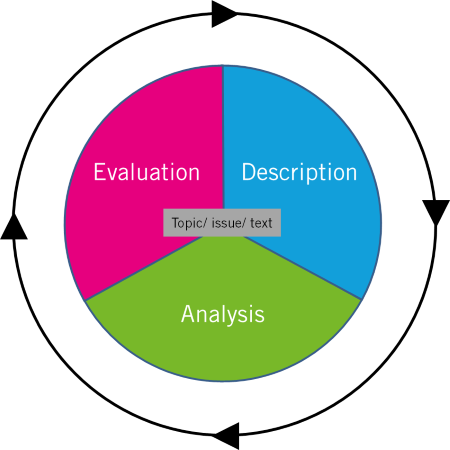


What is critical thinking?
As a university student, you need to be able to think critically about the resources and information you use in your work. You need to ask the right questions when reading the work of others; your writing needs to show you have the ability to weigh up different arguments and perspectives and use evidence to help you form your own opinions, arguments, theories and ideas. Critical thinking is about questioning and learning with an open mind.
Critical thinking should help you to:
This useful guide from Plymouth University provides an introduction to critical thinking and stresses the importance of asking and answering questions. Critical, is the attempt to ask and answer questions systematically. This means asking the most useful questions in the most productive sequence in order to yield a coherent and credible ‘story’. Download the guide from here!
Thinking, reading and writing critically
My Learning Essentials from The University of Manchester have created this interactive tutorial that explores how to be critical, highlighting practical strategies you can use in your academic reading and writing that will enable you to demonstrate critical analysis in your assignments.
Access the tutorial from here!
A model for critical thinking
The model shows you how to use common questioning words such as "What?", "Who?", "How?", "Why?" and "What if?" to take you through the stages of description, analysis and evaluation:

These questions will generate purely descriptive answers. You will gain a general understanding of who wrote the text, when it was written, and what the main ideas or arguments are.
Through answering these questions you will only be able to reiterate what an author has said, but not demonstrate your understanding of the significance of the text.
Whilst these questions are important to gain an initial understanding of an issue, topic or text, this is not thinking critically. For that we need to ask more in-depth and challenging questions.
We now move on to the analysis stage. We are not going to accept at face value what we have read, seen or heard.
We need to:
At this stage we are interested in the process or method, as well as the causes, theories and evidence. These questions, especially ‘how?’ and ‘why?’, will help you to develop more analytical answers and deeper thinking.
For example, you might ask yourself:
Finally we come to the evaluative segment. This involves judging the failure or success of something, its implications, significance and/or value.
Evaluation leads us to conclusions or recommendations. This contains questions such as ‘what if?’ and ‘so what?’
Asking these questions will help you to assess the worth and significance of what you have read.
Questions might include:
You won't need to think or read about everything in this much depth. Sometimes just asking the descriptive questions may be enough, for example if you are just reading something to gain a basic understanding of a topic. It is when you need to make sense of and produce assignments, in particular, that you need to engage critically with a topic and this model can be used to help you.
Adapted from University of Leeds (2017) Academic skills – Critical thinking Available at: https://library.leeds.ac.uk/info/1401/academic_skills/105/critical_thinking/2 (Accessed: 23 July 2019).

Download a copy of the Questions to Fire Up Our Critical Thinking Skills to save for later from here!
Evaluating information
Your work will benefit from using high-quality evidence and information. But with so much information out there, how can you decide what to use? Not everything you find, particularly on the web, is of a good standard or appropriate for academic study. You need to be able to think critically and judge what is relevant and appropriate for your purpose.

Adapted from Meriam Library California State University (2010) Evaluating Information – Applying the CRAAP Test Available at: https://library.csuchico.edu/sites/default/files/craap-test.pdf (Accessed: 23 July 2019).
Download a copy of applying the CRAAP test for later from here!
Finding the good stuff: evaluating your sources
My Learning Essentials from The University of Manchester created this interactive tutorial explores the process of evaluating the sources you find to ensure they are relevant and quality assured, equipping you with the skills you need to identify high-quality information to use in your academic work.
Access the tutorial from here!
Evaluating information checklist
The University of Leeds created a checklist introducing the main criteria that can help determine whether or not you feel confident to use a piece of information as part of your studies.
Download the checklist from here!